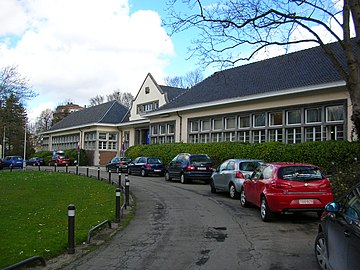Université libre de Bruxelles
The Université libre de Bruxelles (French: [ynivɛʁsite libʁ də bʁysɛl]; English: Free University of Brussels; abbreviated ULB) is a French-speaking research university in Brussels, Belgium. ULB is one of the two institutions tracing their origins to the Free University of Brussels, founded in 1834 by the lawyer and liberal politician Pierre-Théodore Verhaegen.
This article is about the current French-speaking university. For the 1834–1969 university, see Free University of Brussels (1834–1969). For the current Dutch-speaking university, see Vrije Universiteit Brussel.Motto
Scientia vincere tenebras (Latin)
Conquering darkness by science
Independent/partly state funded
1834 (Free University of Brussels)
1970 (ULB)
Pierre Gurdjian
Annemie Schaus
4,400
37,489 (2023-24)[1]
Solbosch, Plaine, Erasme, Gosselies
The split occurred along linguistic lines, forming the French-speaking ULB in 1969, and Dutch-speaking Vrije Universiteit Brussel (VUB) in 1970. One of the leading Belgian universities open to Europe and the world,[2][3] the ULB now has about 24,200 students, 33% of whom come from abroad, and an equally cosmopolitan staff.[4]
The ULB comprises three main campuses: the Solbosch campus, on the territories of the City of Brussels and Ixelles municipalities in the Brussels-Capital Region, the Plaine campus in Ixelles, and the Erasmus campus in Anderlecht, beside the Erasmus Hospital.
The main and largest campus of the university is the Solbosch, which hosts the administration and general services of the university. It also includes most of the faculties of the humanities, the École polytechnique, the large library of social sciences, and among the museums of the ULB, the Museum of Zoology and Anthropology,[17] the Allende exhibition room and the Michel de Ghelderode Museum-Library.
The Plaine campus hosts the Faculty of Science and the Faculty of Pharmacy. There are also the Experimentariums of physics and chemistry, the Museum of Medicinal Plants and Pharmacy[18] and student housing. This site is served by Delta station.
The Erasmus campus houses the Erasmus Hospital and the Pôle Santé, the Faculty of Medicine, the School of Public Health and the Faculty of Motor Sciences. There is also the School of Nursing (with the Haute école libre de Bruxelles – Ilya Prigogine), the Museum of Medicine[19] and the Museum of Human Anatomy and Embryology.[20] This site is served by Erasme/Erasmus metro station.
The university also has buildings and activities in the Brussels municipality of Auderghem, and outside of Brussels, in Charleroi on the Aéropole Science Park and Nivelles.
Research[edit]
At the heart of the Free University of Brussels there are at least 2000 PhD students and around 3600 researchers and lecturers who work around different scientific fields and produce cutting-edge research.
The projects of these scientists span thematics that concern exact, applied and human sciences and researchers at the heart of the ULB have been awarded numerous international awards and recognitions.
The research carried out at the ULB is financed by different bodies such as the European Research Council, the Walloon Region, the Brussels Capital Region, the National Fund for Scientific Research, or one of the foundations that are dedicated to research at the ULB; the ULB Foundation or the Erasme Funds.
Since the early 2000s, the MAPP project has started studying political party membership evolution through the time.
University rankings
101–150 (2023)
211 (2020–21)
359 (2020)
189 (2024)
201–250 (2024)
=222 (2023)
For pre-1970 notable faculty and alumni, see Free University of Brussels:
![]() Media related to Université libre de Bruxelles at Wikimedia Commons
Media related to Université libre de Bruxelles at Wikimedia Commons
50°48′42″N 4°22′52″E / 50.81167°N 4.38111°E


